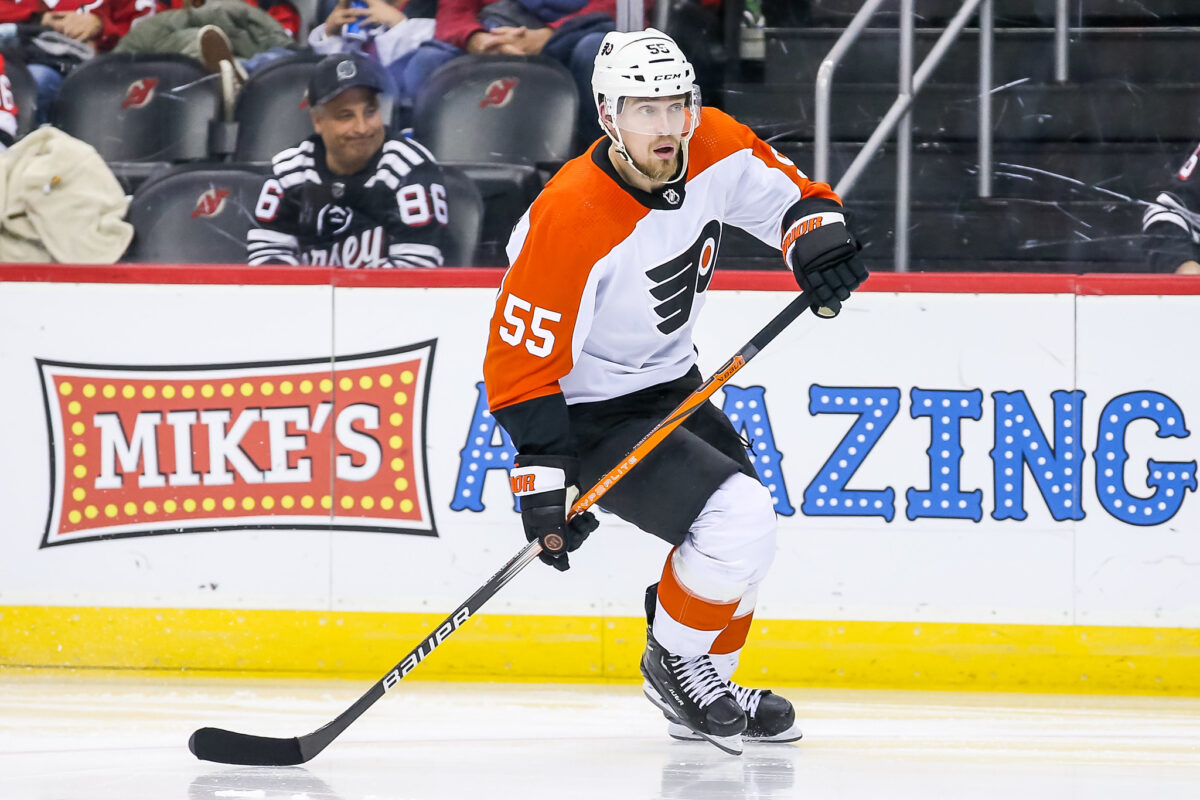Essentially the entire roster of the Philadelphia Flyers is filled with trade bait from top to bottom for the 2024 offseason. In a rebuild and trying to acquire talent, pretty much no player is off limits, including 29-year-old defenseman Rasmus Ristolainen.
What are some pros and cons of potentially trading Ristolainen? There seem to be some compelling arguments for both sides, so let’s take a look.
Pros of a Ristolainen Trade
Regarding a deal, let’s start with the pros. For starters, he is coming off his best season as a Flyer, and perhaps the best of his entire career — his value might never be any higher. With three seasons left on his contract, can Philadelphia justify banking on him sustaining that after missing 51 games in the regular season due to injury? Are they in a position to turn down potential draft picks in return for him as a rebuilder that needs prospect upside?

Considering Ristolainen’s $5.1 million cap hit, the Flyers likely wouldn’t get a ton of compensation, but it would still be enough to make an impact. Considering how well they drafted in the third, fourth, and fifth rounds in 2023, any increase in draft stock is worthwhile.
On top of a return, the Flyers can also shed some salary. When a rebuilder can free up some cap space to make some future moves, whether it be taking on a bad contract for draft picks or acquiring a young player with a bigger salary, they should try and do that. Cap space is one of the most valuable things a team can have in the modern NHL, and contenders are always looking to weaponize it.
Finally, trading Ristolainen can free up a roster spot on a competitive Philadelphia defense. They might want to get depth players like Adam Ginning, Egor Zamula, and Ronnie Attard a shot next season — that won’t really be possible unless someone on the back end is dealt. Down the line, right-handed defensive prospects Oliver Bonk and Carter Sotheran will want to join the Orange and Black, too. Having both of them essentially blocked from a lineup spot wouldn’t do the Flyers any good.
Cons of a Ristolainen Trade
Even though the Flyers are in a rebuild, Ristolainen doesn’t necessarily have to be traded with no questions asked — Philadelphia has options. In 2023-24, he was at his best as a third-pairing player, providing some tenacity and genuinely good on-ice defense in the process. That doesn’t seem very outlandish to sustain, seeing as he spent his whole career facing much tougher minutes. When he wasn’t constantly facing the best of the best, he played pretty well.
Right now, it seems as though Ristolainen would be more important to the Flyers than he would be for another team. A young defenseman like Emil Andrae could benefit from his veteran experience and new defensive excellence. Andrae can focus on the offense and improve his two-way game little by little, while Ristolainen can be more defensively oriented.
Since he is making so much, the Flyers would likely have to retain Ristolainen’s deal. The issue with trading him is that his value is somewhat low to justify salary retention for the next three seasons — the Flyers already have one of three possible retention spots taken up by Kevin Hayes through 2025-26. Trading the veteran defenseman would limit their trade deadline options, which isn’t too much of an issue but definitely not ideal.
Related: Philadelphia Flyers Should Have Traded Scott Laughton Instead of Kevin Hayes
Since Ristolainen has that term, the Flyers can hold off on a deal. It might be most beneficial for the Orange and Black to have two retention slots for the next two seasons, and then explore trading him on the last year of his contract. At that point, he could be a low-risk, high-reward addition for a playoff team hunting punishing physicality. The Flyers would be rewarded for providing a player like this.
Finally, if the Flyers want Ristolainen to play further up in the lineup whether it be because of injury or trade of someone like Travis Sanheim, he might be able to handle that. He played a game in a first-pairing role with Cam York due to an injury for Sanheim, and the Flyers got a 1-0 shutout. If he can be a good up-and-down-the-lineup player, the Orange and Black might want to hang onto him for the time being.
Final Verdict: Flyers Should Explore Their Options
Ultimately, Ristolainen is the type of player you can wait on. The positives and negatives on each side are important enough to make this a non-concrete decision. General manager (GM) Danny Briere should see what he can get on the market. If he doesn’t like what is being offered, he might be able to boost Ristolainen’s value for the 2025 offseason by letting him have another successful campaign. There doesn’t seem to be a bad option in this scenario.
For some players with term on their contracts, there is some certainty in their game. For example, Scott Laughton has struggled for the last three seasons — it’s unlikely for him to improve in a Flyer uniform. Sanheim was fairly good for the Flyers in 2023-24, but his upside is probably not much more than what he showed. Ristolainen differs from these two, considering his upside is just being realized. Depending on how likely Briere thinks it is for Ristolainen to continue his progression, that’s what he’ll be looking for in a trade.
With all this being said, this is a huge improvement from where the Flyers were regarding Ristolainen in the 2023 offseason. Back then, he seemed untradeable because of his contract. Today, Briere has some options. GMs across the league should be flocking to him rather than the other way around.